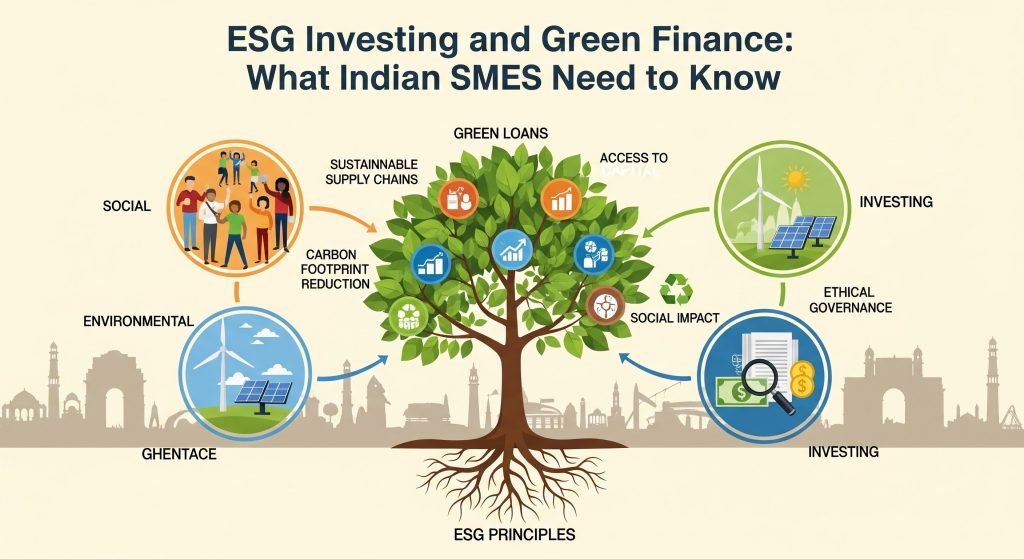ESG Investing and Green Finance: What Indian SMEs Need to Know
ESG investing and green finance are becoming essential for Indian small and medium businesses. ESG refers to how a business manages the environment, treats employees and society fairly and honestly, and follows ethical business practices. Today, many customers, investors, and big companies prefer to work with businesses that act responsibly.
Green finance helps SMEs get loans, subsidies, and support for clean energy and eco-friendly projects. By adopting ESG practices, small businesses can save costs, improve their image, and stay prepared for future regulations and market demands.

Understanding ESG and Its Growing Importance
ESG is a framework for assessing how companies handle environmental, social, and governance issues. Environmental factors include energy use, waste, and carbon emissions. Social factors cover employee welfare, diversity, and community engagement. Governance focuses on ethics, transparency, and leadership. Many Indian SMEs now see ESG as crucial for running their business.
Essentials:
- Environmental: energy, waste, carbon emissions.
- Social: employee welfare, diversity, community support.
- Governance: ethics, transparency, responsible leadership.
Urgency of ESG Adoption for Indian SMEs
MSMEs produce 3-4% of India’s carbon emissions, about 110 million tonnes of CO2 each year. India plans to reach net-zero emissions by 2070, so SMEs need to act now. ESG adoption helps reduce environmental impact and meet national goals.
Key takeaways:
- SMEs contribute significantly to carbon emissions.
- ESG helps meet climate targets.
- Acting now ensures sustainable growth.
Green Finance: Unlocking Sustainable Growth Opportunities
Green finance is funding for projects that benefit the environment. SMEs can use it to adopt renewable energy, improve efficiency, and invest in sustainable infrastructure and waste management. This reduces pollution and helps businesses save money.
Highlights:
- Funding for renewable energy and energy-saving projects.
- Supports sustainable operations.
- Helps SMEs save costs and grow responsibly.
H2: Current Market Landscape
India’s sustainable debt market reached USD 55.9 billion by December 2024, growing 186% since 2021. Green bonds make up the largest share of this market. Government green bonds worth ₹47,700 crore improve liquidity and investor confidence.
H3: Notable facts:
- Green bonds dominate the market.
- Government support makes the market strong.
- Market growth shows more interest in ESG.
Key Green Financing Options for SMEs
1. SIDBI Green Finance Schemes
SIDBI provides green loans from ₹25 lakhs to ₹3 crores at low interest rates. These loans support energy-saving projects, renewable energy, and cleaner production methods.
2. Sustainable Business Funding
Banks and NBFCs offer green loans to SMEs with UDYAM registration. These loans have lower interest rates and faster approval for eco-friendly projects.
3. Solar Energy Subsidies
The government gives subsidies for rooftop solar systems. SMEs can reduce installation costs by 20–40% through these benefits.
4. Government Green Initiatives
A ₹15,000 crore government program will support green technology and waste management for MSMEs. It will help businesses move towards clean energy and recycling systems.
Investment Opportunities and Market Access
ESG compliance helps SMEs get into global supply chains and attract investors interested in sustainable businesses. Companies with ESG-friendly practices can grow faster and reach new customers.
Insights:
- Builds trust with bigger companies.
- Attracts ESG-focused investors.
- Opens new business opportunities.
Financial Benefits of ESG
Using ESG practices improves credit scores and reduces borrowing costs. Green technologies like solar panels also lower operational costs and provide good returns over time.
Advantages:
- Better access to loans and finance.
- Saves money through energy efficiency.
- Good return on investment in sustainable projects.
Market Expansion Opportunities
SMEs that follow ESG principles improve their brand image and customer trust. Many consumers prefer eco-friendly brands, which helps SMEs grow and compete in the market.
Benefits:
- Strengthens brand reputation.
- Builds customer trust.
- Increases sales in sustainability-focused markets.
Navigating ESG Compliance Requirements
SEBI’s BRSR framework requires big companies to report ESG metrics. This affects SMEs in their supply chains. From FY 2025-26, SMEs that do significant business with listed companies must provide ESG data.
Compliance notes:
- Compliance affects SMEs linked to big companies.
- Reporting ensures transparency.
- Covers environmental, social, and governance factors.
Overcoming Implementation Challenges
SMEs face high initial costs, limited technical knowledge, and gaps in awareness. Government subsidies, tax benefits, and programs like PM Surya Ghar or ZED certification help reduce barriers. Consulting firms, industry groups, and digital tools can make ESG adoption easier.
Practical takeaways:
- Government support lowers costs.
- Training and partnerships improve skills.
- Digital tools simplify monitoring and reporting.
Economic Impact and ROI Analysis
ESG investments save money. Energy efficiency can reduce costs by 20-30%, and renewable energy can cut electricity bills by up to 90%. SMEs can also earn from carbon credits, and ESG compliance helps access international markets.
Business advantages:
- Saves money on energy and operations.
- Generates extra revenue through carbon credits.
- Opens new market opportunities.
Future Outlook and Strategic Recommendations
India’s green finance market will need $1.3 trillion by 2030, offering huge opportunities for SMEs. Immediate steps include ESG assessments, energy audits, and ISO 14001 certification. Medium-term goals involve renewable energy investments and reporting frameworks. Long-term strategies target carbon neutrality and circular economy practices.
Strategic notes:
- Large funding opportunity for green projects.
- ESG adoption ensures sustainable growth.
- Planning early strengthens market position.
Conclusion
ESG investing and green finance are no longer optional for Indian SMEs. They help businesses save money, improve operations, and build trust with customers, investors, and partners. Government schemes and green funding make it easier for SMEs to start this journey without heavy financial pressure.
By adopting sustainable practices early, SMEs can meet future rules, enter new markets, and grow responsibly. Businesses that focus on ESG today will be better prepared for tomorrow and will play an important role in building a stronger and greener Indian economy.
Get Expert Assistance
Related Articles
 GSTR-3B New Rules from Jan 2026: Full GST Guide
GSTR-3B New Rules from Jan 2026: Full GST Guide Undisclosed Foreign Assets: What Taxpayers Need to Know under Budget 2026–27
Undisclosed Foreign Assets: What Taxpayers Need to Know under Budget 2026–27 Large Value Funds (LVFs): SEBI’s 2025 Reforms and Their Impact on Institutional Capital
Large Value Funds (LVFs): SEBI’s 2025 Reforms and Their Impact on Institutional Capital Key Clauses of a Partnership Deed in India
Key Clauses of a Partnership Deed in India Registered Partnership Deed in India: Legal Recognition, Benefits, Compliance, and Why It Matters
Registered Partnership Deed in India: Legal Recognition, Benefits, Compliance, and Why It Matters
Recent Articles
 GSTR-3B New Rules from Jan 2026: Full GST Guide
GSTR-3B New Rules from Jan 2026: Full GST Guide Undisclosed Foreign Assets: What Taxpayers Need to Know under Budget 2026–27
Undisclosed Foreign Assets: What Taxpayers Need to Know under Budget 2026–27 Large Value Funds (LVFs): SEBI’s 2025 Reforms and Their Impact on Institutional Capital
Large Value Funds (LVFs): SEBI’s 2025 Reforms and Their Impact on Institutional Capital Key Clauses of a Partnership Deed in India
Key Clauses of a Partnership Deed in India Registered Partnership Deed in India: Legal Recognition, Benefits, Compliance, and Why It Matters
Registered Partnership Deed in India: Legal Recognition, Benefits, Compliance, and Why It Matters
FAQ
What is ESG in simple words?
Why is ESG important for Indian SMEs?
What is green finance?
Can small SMEs also get green finance?
How can an SME start ESG practices?
Contact Us
- 50, Bright Arcade, 12th Main Rd, 4th T Block East, KV Layout, Jayanagar, Bengaluru – 560011, Karnataka
- +91 97397 36999
- mgmt@chhotacfo.com
Useful Links
©2024.CHHOTA CFO - All rights reserved



